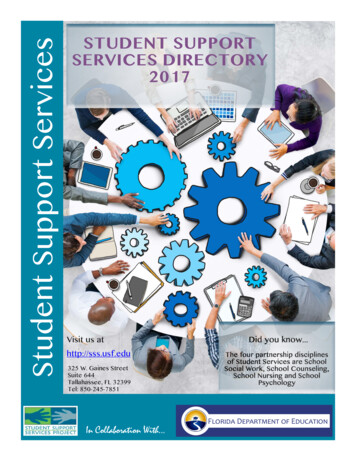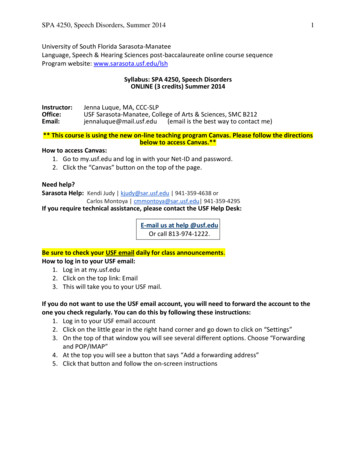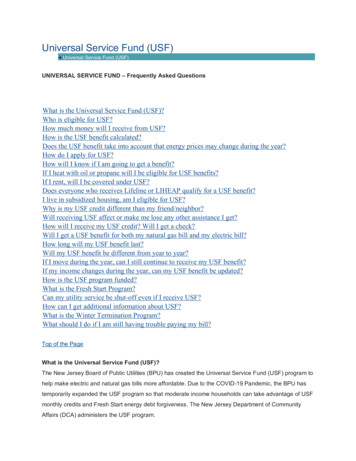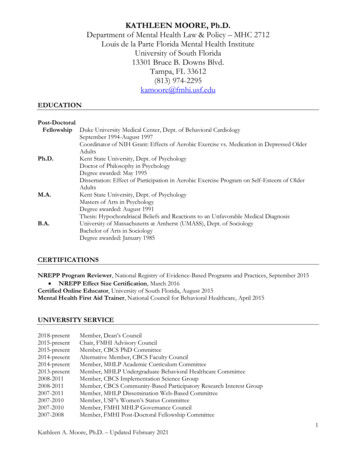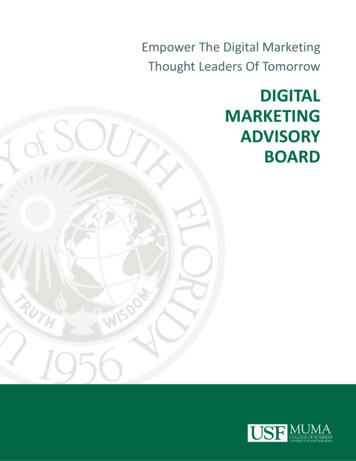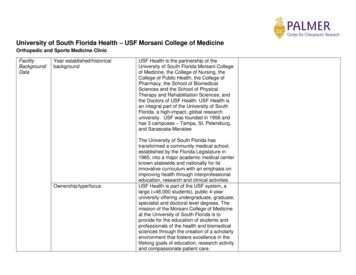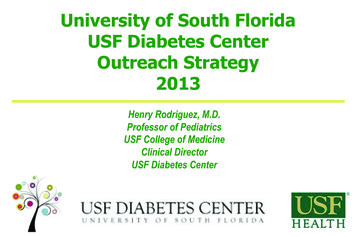
Transcription
http://cfs.fmhi.usf.eduQuarterlyFA L L 2 0 1 0college of behavioral and community sciences louis de la par te florida mental health instituteCFS Crosses State and International Boundaries to Serve Children and YouthAsuccessful partnership was formed across stateand international boundaries when USF wasasked to provide consultation and training,first in Ottawa, Canada and later in Arizona, to helpassess changes needed for their systems that servechildren and youth with complex mental healthissues.CFS faculty, along with John Mayo, DeputyExecutive Director of Success4Kids & Families,Inc. in Tampa, provided training in Ottawa on theSystem of Care Practice Review (SOCPR), an assessment tool developed by CFS Department Chair,Dr. Mario Hernandez. Mayo describes that “thepartnership with CFS blends academia and researchwith direct service and parents who have gonethrough the system.” Mayo has experience both as atrainer of the SOCPR, as well as a provider utilizingthe information gained from it. During the past fewyears, Mayo has teamed with CFS faculty includingSharon Hodges, Keren Vergon, Mary Armstrong,Norín Dollard, Steve Roggenbaum, and others onvarious SOCPR trainings for communities in Iowa,Tennessee, and Mississippi, as well as Canada.The SOCPR ProtocolThe SOCPR is a practice-based, quality improvement protocol that examines a program, agency, orsystem’s adherence to system of care values and principles at the level of practice. The three core systemof care values include practice that is child-centered,community based, and culturally competent. Theguiding principles describe how these values arepracticed: that services that are integrated, coordinated and individualized through case management;that children have access to a comprehensive arrayof services in a system that promotes early identification and intervention; that services are received inthe least restrictive environment; that families areincluded in full service planning and delivery; andthat the rights of children are protected while ensuring a smooth transition to adult services when theyreach maturity. The SOCPR, through the collectionof in-depth information from chart reviews andinterviews with youth, families, formal providers andinformal supports, provides a measure of how well acommunity’s overall service delivery system is meeting the needs of children, youth, and their families.Success in CanadaOttawa’s Children’s Coordinated Access &Referral to Services program used the tool to gaininsight into their system strengths and challenges,as well as to deliver training needed for directservice staff across the mental health system. TheSOCPR results have created variousadvancements within the Ottawachildren’s mental health system,including the development of atraining fund for staff and theadoption of a common treatmentapproach based on system of carevalues and principles. NatashaTatartcheff-Quesnel, Manager ofthe Ottawa Children’s CoordinatedAccess & Referral to Services, saidthat the SOCPR provided theircommunity with the ability todevelop a community action planbased on the results. She addsthat “the process has brought ourcommunity closer together in manyways. It has given us direction in our transformationprocess and a means for evaluating those changes atthe level of practice over time.” Natasha goes on tosay that “the experience of using this tool has beenwonderful and the benefits have far outweighed anyof the challenges. We are committed to using thetool for at least the next five years in order to alsotrack progress over time.” Ottawa’s successful useof the SOCPR has provided the foundation for usein other communities. Dr. Hernandez commentedthat “we were so impressed with how Ottawaimplemented the SOCPR. Their experiences andknowledge gained became an excellent sharingopportunity when Arizona requested our services.”Taking the SOCPR to ArizonaArizona has become the first state to implementthe SOCPR statewide. In Arizona, Dr. Hernandezfirst provided consultation with the Departmentof Health/Division of Behavioral Health Services(ADHS/DBHS) to develop a statewide Theoryof Change that expresses the state’s strategies forimplementing behavioral health services for childrenand their families. The Theory of Change is depictedin a Logic Model, a diagram that captures the globalaspects of Arizona’s children’s system of care. Thisvisual logic model links to detailed informationregarding Arizona’s system of care approach. “Weconsulted with multiple national and local expertsin practice review and survey development, andultimately it was determined that the SOCPR – asfar as measuring fidelity to system of care valuesand principles – would be able to nicely addressArizona’s needs,” said Sara Salek, MD, MedicalDirector for Children Services at ADHS/DBHS.Dr. Salek commented that Keren Vergon (USF) andJohn Mayo (S4KF) were instrumental in helpingthem. “They provided technical assistance all alongthe way to insure we are implementing this toolin the fashion that it’s meant to be.” KimberlyEngle, Bureau Chief, Children’s System of Care atADHS/DBHS, added, “It was really a huge learningexperience for us to be able to pull the pieces andcomponents of our children’s system together and tomake sure everything coordinated well.”Arizona’s training in the SOCPR requiredparticipation by a large team. In order to meet theneed, USF and Success4Kids & Families partneredwith Ottawa. The partnership was beneficial for allinvolved. “Conducting the SOCPR outside yourown community forces complete objectivity andreinforces the tenets of evaluating only what yousee,” said Ottawa’s Natasha Tatartcheff-Quesnel.“The international partnership forged between ourcommunities has allowed us to learn in a completelydifferent way, to share our experiences, and to trulyimprove our system. While we began the partnershipas a student/teacher relationship, we have movedto one of colleagues who are able to learn from oneanother.” Dr. Hernandez believes that this effectivepartnership sets the stage for further disseminationof the SOCPR. “The international collaborationreinforced just how well the SOCPR can be utilizedacross multiple settings.”A narration of Arizona’s logic model can beviewed at www.azdhs.gov/bhs/AZ sys careWebFiles/index.htm
Graduate Studies in Behavioral HealthBehavioral Health DegreesThe Doctor of Public Health (DrPH)Focus in Behavioral Health is anadvanced professional degree programfor students intending to pursueleadership and executive managementopportunities in behavioral healthservices.The Doctor of Philosophy (PhD) Focusin Behavioral Health is an advancedresearch degree program for studentsintending to pursue academic, research,or high-level administrative careers inbehavioral health services.The Master of Public Health (MPH)Concentration in Behavioral Health is anon-thesis degree program that preparesstudents for a professional career inbehavioral health services.The Master of Science in Public Health(MSPH) Focus in Behavioral Health isa thesis degree program that preparesstudents for careers in applied behavioralhealth research and outcomes evaluation.The Masters of Social Work/Masters ofPublic Health Dual-Degree Program(MSW/MPH) (Behavioral HealthConcentration) is an advanced dualdegree program for students interestedin combining clinical social work withpublic health and a concentration inbehavioral health (including mentalhealth and substance abuse services).For additional information, contact BruceLubotsky Levin, DrPH at levin@fmhi.usf.edu or blevin@health.usf.edu, 813-9746400.Degrees Offer Behavioral Health Focus in Public HealthAAre you interested in a job that helps improve the health and quality of life for entirecommunities, specific populations such as the homeless, or those struggling with mentalhealth or substance abuse issues? Whether interested in organizing systems, planningservices, conducting research or educating others, USF offers five graduate programs thatwill prepare students for leadership roles within local, state or federal mental health organizations,faculty and research positions within academic settings, as well as a variety of positions in communityand social services agencies.USF’s College of Behavioral and Community Sciences (CBCS) and College of Public Health(COPH) jointly offer a specialty concentration in behavioral health as part of the Master andDoctoral programs in the COPH Department of Community & Family Health (DCFH). TheGraduate Studies in Behavioral Health Program examines community and family issues in policy,evaluation, systems performance, and outcomes of alcohol, drug abuse, and mental health services.“The Graduate Studies in Behavioral Health Program has blossomed overthe years and proves to be one of our more popular degree programs in thedepartment,” said Julie A. Baldwin, PhD, DCFH Professor and Chair. “I amtruly thankful to the FMHI faculty, under the aegis of Bruce Lubotsky Levin.They have done a remarkable job of providing leadership in emphasizing, to bothfaculty and students in the COPH, the importance of examining behavioralhealth problems within a public health perspective.”Julie A. Baldwin, PhD, DCFHFrom Employee to StudentAmy Green found her way to USF as anemployee first. Although beginning the PhDprogram this fall, she has worked within theDepartment of Child & Family Studies (CFS)since 2009 as a statistical data analyst, a job shefeels was written just for her. Amy is currentlycoordinating research activities for severalprojects, including an IES funded project thatis looking at the feasibility of an interventionaimed at increasing the engagement of familiesin the broad educational development of theirchildren.Amy received her undergraduate degree inPsychology ten years ago, and soon after beganworking toward a PhD in clinical psychology.“I realized I had a greater interest inaddressing children’s mental health issues at thepopulation level, rather than the individual level,where prevention efforts can have a broaderimpact,” said Amy. “I switched to a PhD inEpidemiology at Virginia CommonwealthUniversity, and then life happened. I had twins,my husband was transferred, and eventually weended up in Orlando. My academic career wasput on hold.”Dr. Bruce Levin takes time to discuss courses withdoctoral student Amy Green.2 CFS Quarterly Fall 2010Amy started surfing the web for jobs, andcame across a posting at USF working withDrs. Krista Kutash and Al Duchnowski in CFS.She was toldduring theinterview thatthe positionwould allowher theability totake classes.When shementionedher interests Amy Greenin children’smental health services, epidemiology and thepursuit of a PhD degree, she was introduced toDr. Bruce Levin, Head of the USF GraduateStudies in Behavioral Health Program. Amyspent the last year taking prerequisite courses,and is now on her way toward a Doctor ofPhilosophy (PhD) Focus in Behavioral Health.“I am looking forward to the knowledge andskills I will gain by being a part of a programthat will allow me to examine mental healthfrom a public health perspective.”“Drs. Kutash and Duchnowskiare committed to helping meachieve my goals,” said Amy.“Their encouragement andsupport have been indispensible.”
Public /Behavioral HealthEmployment GrowthStudents Share their InterestsThe Graduate Studies in BehavioralHealth program draws interest from bothundergraduates seeking higher education degreesand professionals who have been in the field foryears and want to advancetheir skills and degrees.“For me to have thisexposure goes above andbeyond my expectations,”said Donna Burton, whobegan the Doctor ofPhilosophy (PhD) FocusDonna Burtonin Behavioral Healthprogram in 2007. Beforedeciding to pursue the degree, Donna spent 15years as a practitioner and administrator – firstin a residential setting working with adults withsubstance abuse and mental disorders – and laterwith adolescents, where her main interests arenow focused.Donna shared her concern about what ishappening with youth today.“With many extracurricular school programsbeing dropped and fewer intact families, kids havefewer protective factors. They often have littlesense of belongingness or accomplishment as aperson – and no way to explore who they are. Wetake kids at risk and help eliminate risk factors,such as substance abuse, and help them to explorepersonal interests and develop skills and talents.”Donna’s dissertation research involvesimplementation of evidence-based drug abuseprevention programs in schools. She is workingwith CFS’s Dr. Tom Massey on one of hisprojects within Hillsborough County schools.“I am looking at how practice can influenceresearch. We need to listen to professionals inthe field, and understand what works for them.Practitioners need to be engaged in the research,and both sides seen as mutual partners.”“The advisors are great,” added Donna. “Interms of my personality and my focus, they tookthe time to match us so that we are better guidedin the process for research dissemination.”Dr. Roger Casey, the first doctoral graduate inpublic health with a behavioral health focus andDirector of the Department of Veterans Affairs/National Center on Homelessness AmongVeterans, recently shared his thoughts.“Students have the opportunity to study thecomplex delivery issues unique to the field ofbehavioral health services research. The programprovided me with expanded insights andgreater opportunities within the VA. I credit theexistence of the Graduate Studies in BehavioralHealth Program for greatly influencing myability to develop my dissertation topic andproviding courses which allowed me to expandmy knowledge base in the areas of homelessnessand mental disorders.”The curriculum at the doctoral level isdesigned to be individualized based upon thestudent’s career goals and previous experiences.“I took the first course to see what itwas about and found the material was soimmediately transferrable to the field and sorelevant to what was really happening,” saidDonna Burton. “It’s an intensive program thatrequires lots of time and attention, but I havenot had the feeling at all that the content isn’tuseful.”MPH Master of Public Health(Behavioral Health Concentration)Sarah BonnemaUndergraduatedegree: Journalism &Mass Communications(and two courses shortof Psychology doublemajor); sociology minor.Whitworth University.Sarah BonnemaWhat got you interested in the GraduateStudies in Behavioral Health program?In the summer of 2007, I was awarded MayoClinic’s Summer Mentored UndergraduateResearch Fellowship. I worked as part ofMayo’s Behavioral Health Research Group. Iwound up working with them for 15 monthsand became very interested in behavioral healthissues. When graduation approached, I appliedto clinical psychology programs and to USF’sBehavioral Health MPH program, whichseemed like a unique offering among MPHprograms in the United States. I got acceptedto several programs, but the MPH struck me asa very versatile degree that could either prepareme for PhD level work or offer me lots ofopportunities at the Master’s level. I decided togo for the MPH!continued Bureau of Labor Statistics’s data andprojections for many of the commonspecialty areas in public health (mostgrowth dates are between 2008 and 2018):Employment in community and socialservices occupations is projected toincrease by 16%, growing by roughly448,400 jobs. As health insuranceproviders increasingly cover mental andbehavioral health treatment, and as agrowing number of elderly individuals seeksocial services, demand for these workerswill increase.Employment of substance abuse andbehavioral disorder counselors isexpected to grow by 21%, which is muchfaster than the average for all occupations.As society becomes more knowledgeableabout addiction, more people are seekingtreatment. Furthermore, drug offendersare increasingly being sent to treatmentprograms rather than to jail.Employment of mental health counselorsis expected to grow by 24%, whichis much faster than the average for alloccupations. Under managed care systems,insurance companies increasingly areproviding for reimbursement of counselorsas a less costly alternative to psychiatristsand psychologists. In addition, there hasbeen increased demand for mental healthservices as individuals become more willingto seek help.Epidemiologists make up about 5% ofthe employees in the medical scientistcategory—which altogether accounts forroughly 92,000 jobs. These careers, whileoften competitive, are currently growing at arate of 20%, which is faster than the averagerate for all careers. Epidemiologists will findjob opportunities working for the government, hospitals, colleges and universities,and research and development facilities.Health Educators – Overall, about62,000 health educators worked in theUS in 2006, and job opportunities areincreasing at a rate of 26%. The mainopportunities for public health educatorsare found in state and local public healthdepartments.Social Workers – Medical and publichealth social workers can expect about24% growth in job opportunities—whichmeans that the number of employees inthe field will increase by about 30,000.CFS Quarterly Fall 2010 3
Professional Development sarah bonnema continuedWhat are your plans after graduation?My MPH studies have really helped me defineand articulate what my passion is: to give othersthe tools and support they need to live a healthylife. To me, living “a healthy life” means thatsomeone is satisfied with their physical, mental,and social health and has the skills and selfconfidence to make changes when they becomedissatisfied.I can see my career going one of fourdirections: a leadership position at a nonprofitorganization focusing on behavioral healthissues; corporate wellness; health and fitnesswriting; or going back to school to becomea Licensed Mental Health Counselor. I willbe working for the Ophelia Project & BoysInitiative as a Program Facilitator to continueexploring the nonprofit world. I appreciate howmany options my MPH gives me!How do you feel the program has preparedyou for employment?I think it prepares you well for a variety ofpositions. The program requirements lead youinto great opportunities to make connections forthat first position. For example, I interned at theOphelia Project & Boys Initiative as part of therequired Field Experience and also completedmy special project with them. As soon as myField Experience ended, I was offered a contractposition. I would have never had my foot in thedoor at that organization without the BehavioralHealth MPH program.Is there anything else you would like to share?Dr. Levin has been a wonderful advisorthroughout the whole process. He really caresabout each student and is dedicated to helpingyou succeed.Dr. Norín Dollard and Dr. Mary Armstrongtaught a fantastic course on Children’s MentalHealth. I find myself referencing that classfrequently as I work with middle schoolstudents. The Social Marketing Field School is aMUST! The program’s interdisciplinary natureis a great benefit that often goes unadvertised. Ireally enjoyed taking classes with the dual MPHMSW students because most of the MSWstudents are currently working in the social workfield and can lend great insight to the behavioralhealth discussions.4 CFS Quarterly Fall 2010Academic CertificatesPositive Behavior SupportThis new certificate program will benefit students by equipping them with necessary skills toprovide systemic applications of PBS. The applications vary from understanding consultationat the individual level at home and in the community, with young children in preschoolsettings and/or school age children within classrooms and schools. Applicants must hold abachelor’s degree from a regionally accredited institution with a GPA of 3.0 or better. Up to12 hours of certificate course credits may be applied to a graduate degree with departmentalapproval. Visit www.gradcerts.usf.edu.Graduate Certificate in Children’s Mental HealthSince 2006, CFS has offered a fully on-line program to createa new generation of professionals to provide leadership in theimplementation of systems of care for children who have mentalhealth challenges and their families. The Graduate Certificate inChildren’s Mental Health distance learning program consists of15 hours of credit, with courses taught by faculty from USF andother universities participating in the SOC Professional TrainingConsortium. To date, more than 80 students from 11 states havebeen admitted into the program, generating more than 1,000student credit hours. Twenty-eight students have been awarded theCertificate.“The graduate certificate courses provided me with practical andapplicable knowledge that has enhanced my skills in the areas ofsystems and program development, and planning with childrenand their families,” said Renee’ Dozier, MPA, from Region VSystems Behavioral Health in Lincoln, NE. “I have utilized theskills gained to provide technical assistance to systems partners aswe strive to build a system of care that is collaborative, inclusive,and effective. The professors and faculty were readily available toprovide feedback and support as well as challenge my thinking.”Recent Students AwardedGraduate Certificate inMental Health:Summer 2010Jill SchubauerJanay Bahnsen-PriceBernard HascallMalcolm MilesSusan NathanRenee Dozier(all from Nebraska)Spring 2010Sandra Beekman,Tampa, FLLeona Schick,Anchorage, AKSusan Haley,Venice, FLThe Certificate’s early success at improving the quality andrelevance of education and training in the mental and behavioral health fields quickly led tothe program’s recognition by the Annapolis Coalition on the Behavioral Health Workforceas one of the Innovative Practices highlighted in their Registry of Innovative Practices in2007. Practices were selected for their exceptional degree of innovation, transferability, andeffectiveness.The Graduate Certificate in Children’s Mental Health is an interdisciplinary program thatprovides graduate students with specialized training in children’s mental health, and providesprofessionals with the knowledge to keep pace with the fundamental changes that occur in thefield. Several students in the Rehabilitation & Mental Health Counseling program at the USFCollege of Behavioral & Community Sciences are taking advantage of this unique opportunityto build their credentials in the area of children’s mental health.For additional information on the Graduate Certificate Program, please contact CarolMacKinnon-Lewis 813-974-2075 or lewiscm@usf.edu.“The graduate certificate courses provided me with practicaland applicable knowledge that has enhanced my skills in theareas of systems and program development, and planningwith children and their families.”
ABA Master’s ProgramWelcome new ABAStudents!This year’s impressive class enterswith an average GRE score of1058 and GPA of 3.63.ABA PracticumCoordinator Dr.Timothy Weilwelcomes first-yearstudents to theMaster’s programin Applied BehaviorAnalysis.Class List of 2010Evaluating the Effectiveness of the Travel Assistance Device on the BusRiding Behavior of Individuals with DisabilitiesProfessor Ray Miltenberger from the Master’s Program in Applied Behavior Analysis(ABA) saw an excellent opportunity for interdisciplinary research when he metResearch Associate Sean Barbeau from the USF Center for Urban TransportationResearch (CUTR) at a function hosted by the University Centers for Excellence inDevelopmental Disabilities Education, Research, and Service (housed within CFS).After meeting over lunch with Barbeau and other colleagues to discuss research ideas,Miltenberger shared the information with one of his students from ABA, Arica Bolechala(pictured left). Bolechala and Miltenberger soon began working with Barbeau to helpevaluate a device used for increasing independent bus riding among individuals withdisabilities.According to Bolechala’s recently completed thesis research, Evaluating theEffectiveness of the Travel Assistance Device On the Bus Riding Behavior of Individuals with Disabilities, the TravelAssistance Device (TAD) is a software application for GPS-enabled mobile phones developed by the CUTR and theDepartment of Computer Science & Engineering at USF and funded by the Florida Department of Transportationand the National Center for Transit Research. The TAD prompts individuals via a cell phone to exit the bus at a prescheduled location. Once the software is downloaded to the cell phone, parents, travel trainers, or other authorizedindividuals can access the web management page to schedule trips to be transmitted to the cell phone. The TADoffers phone alerts for the user on thebus, real time tracking of the cell phonevia the web management page, an alarmthat triggers when the user deviates fromthe pre-scheduled route, and estimatedarrival times shown to the rider while theyare waiting for the bus. Bolechala’s thesisdemonstrated that the TAD was successfulin prompting individuals with disabilitiesto exit the bus at the correct location. Priorto the use of the TAD, the individuals werenot able to exit the bus at the correct busstop.Bolechala, Miltenberger, Barbeau,and Gordon submitted this research forpresentation at National Academy ofSciences’ Transportation Research Boardannual meeting and for publication in theproceedings of the meeting. To view thefindings, visit assistance-device/. Amye Bock Emily Braff Christie Cacioppo Corey Cohrs Scott Fontechia Samantha Fuesy Blair Jacobsen Hillary Lamendola Jacquelyn Lansdale Nicole Levesque Alexander Mclean Kelsey Morgan John O’Neill Rosana Pesantes Mary Sawyer Sara Schonwetter Christopher Scull Evan Skelton Jonathan Vincent Stephanie WackSummer Graduates Arica Bolechala Krystal McFee Lindsey Merritt Shannan Smith Elyse WisemanDr. Ray Miltenberger with a gift givento the ABA program from the TampaInterbay Rotary Club. The cycling fundraising event is planned again for nextyear and its proceeds will again supportthe ABA program. Congratulations toDr. Miltenberger and his wonderful ABAteam!CFS Quarterly Fall 2010 5
SpreadingExpertiseSharing OurourExpertiseAging Adults with Intellectual Disabilities:JAMA Commentary First for USF College ofBehavioral & Community SciencesDr. Elizabeth Perkins, a Research Assistant Professorin the Department of Child & Family Studies, hasbecome the first faculty member in the Collegeof Behavioral & Community Sciences to authora Commentary published in the Journal of theAmerican Medical Association (JAMA), one of themost pre-eminent medical journals in the world, andthe most widely circulated.In the Commentary, “Aging Adults withIntellectual Disabilities,” featured in the July 7th issue, Dr. Perkins andco-author Dr. Julie Moran of Beth Israel Deaconess Medical Center - ateaching hospital of Harvard Medical School - urge the medical fieldto become better prepared in providing geriatric health care to therapidly increasing population of aging adults with intellectual disabilities(ID). For more information, visit http://cfs.fmhi.usf.edu/news-detail.cfm?NewsID 622.Third Edition of Mental Health Services TextFocuses on Parity, Transformation and RecoveryA new book edited by faculty from the College ofBehavioral & Community Sciences (CBCS) reflectsnew ideas about how to improve mental health services.Mental Health Services: A Public Health Perspective:Third Edition is edited by CBCS Professors BruceLubotsky Levin and John Petrila, along with KevinD. Hennessy from the US Department of Health andHuman Services. As described in the book’s Foreword, “the focus is nolonger on the specialty mental health services sector but on the broad arrayof human services sectors, where people who experience a mental disorderfind themselves as they pursue their lives in communities.” For moreinformation, visit http://cfs.fmhi.usf.edu/news-detail.cfm?NewsID 625.Trauma-Informed Care Practices in Youth Residential TreatmentDr. Mary Armstrong, Dr. Norín Dollard and Vicki Hummer, MSW,LCSW, along with Dr. John Robst in the CBCS Department of MentalHealth Law & Policy, were recently published in Child Welfare 89(2),the journal of Child Welfare League of America (CWLA). CWLAis the nation’s oldest and largest organization devoted entirely to thewell-being of America’s vulnerable children. The article, Innovations inImplementation of Trauma-Informed Care Practices in Youth ResidentialTreatment: A Curriculum for Organizational Change, describes acurriculum the authors developed for use in youth residential treatmentprograms. For more information, contact Norín Dollard at 813-974-3761or visit http://cfs.fmhi.usf.edu/news-events.cfm.The Rise in Adolescent PregnancyAfter a decade of steady decline in the United States, the rate of teenpregnancy has been on the rise and is now signaling a national crisis.CFS’s Robert Lucio addresses this subject in a paper he co-authored withKatherine Hadley Cornell, Postdoctoral Fellow/School Psychologist atBaltimore City Public Schools. The paper, The Role of School MentalHealth Services in Addressing Adolescent Pregnancy is published in thelatest issue of Advances in School Mental Health Promotion, an academicjournal that publishes material of distinction submitted by those with aclinical, professional, academic or personal interest in promoting mentalhealth in schools.The paper focuses specifically on the relationship between teenpregnancy, mental health and school services. It addresses four areas:»»key mental health and social risk factors and outcomes related to teenpregnancy,»»strategies that have been found to reduce teen pregnancy,»»the role that school mental health providers can hold in servingstudents who are at risk for pregnancy, pregnant or parenting,»»future directions for research, public policy and school-based services.Community Awareness Series: Children’s Suicide PreventionTeen Pregnancy CostsA slideshow presentation titled, “Wa
The Master of Science in Public Health (MSPH) Focus in Behavioral Health is a thesis degree program that prepares students for careers in applied behavioral health research and outcomes evaluation. The Masters of Social Work/Masters of Public Health Dual-Degree Program (MSW/MPH) (Behavioral Health Concentration) is an advanced dual
